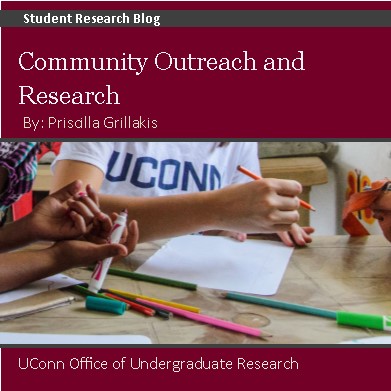 By: Priscilla Grillakis, OUR Peer Research Ambassador
By: Priscilla Grillakis, OUR Peer Research Ambassador
One of the aims of a research project is to learn about or create something that can be used to help others, and often times this could involve aspects of community outreach. Last year, after seeing a need for an improved emergent bilingual program, three of my peers and I applied for an IDEA grant.
We found a specific school to conduct our research in, and hoped that through our developmental stages of the research we would be able to help the current students. We had many steps to our project to ensure we could create the best possible program, with our end goal being to market the program to various schools and organizations to try to help as many emergent bilingual students as possible. Due to coordination and scheduling difficulties with the school we were working with, we had to adjust our project.
Having project that contains components of community outreach has been rewarding, but it has also come with some struggles. If you are considering a project that involves working with an organization in the community, consider these tips!
Be flexible and collaborative
When designing our project, we had created an ambitious timeline and proposal. We had a plan for each week, and had hoped that the school would be able to work with our schedule. This had seemed promising in the beginning, but throughout the year things would come up that would cause scheduling conflicts, and our project would be set back. The only way we were able to overcome this obstacle was by cooperating with the school to make times that would work for everyone.
Choose a topic you are passionate about
Projects that contain components of community outreach typically entail working with people, which can cause various struggles and setbacks. Having passion for the topic you are researching can help inspire you to persevere through any hardships. Our project contained a component of community outreach because we were working with a specific school, and we had hoped that the students we worked with would be able to benefit from our research. We were working with a preexisting establishment, and often times we encountered problems with scheduling or coordinating approvals with this establishment. However, our goal of wanting to help emergent bilingual students motivated us to work through these setbacks and also motivated the teachers and administration of the school to work with us.
Make adjustments as needed
When creating our timeline for our research project, we carefully planned each week so we would be able to accomplish everything we had initially intended. As we watched week-by-week go by without as much progress as we had wanted due to scheduling conflicts, we realized we would need to adjust the plan of our project to accommodate for these changes. While at first it was disheartening to see so much of our project change, we were able to alter our project to make a good, but different, final product. Despite the changes to our project, we were able to maintain the integrity of our goal of helping emergent bilingual students.
Priscilla Grillakis is a junior majoring in Speech, Language and Hearing Sciences and minoring in Spanish. Click here to learn more about Priscilla.